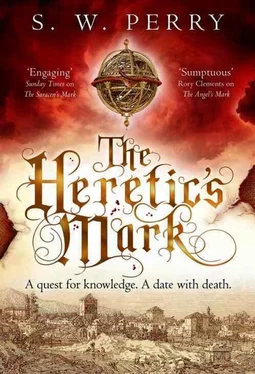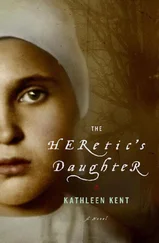‘If you have, I promise you this: at a moment of my choosing, your eyes will begin to burn, and they will go on burning until they are as black and shrivelled as raisins. Now, repeat the instructions I gave you.’
Half-thrilled, half-terrified, Carlotta does as her friend commands her. She finishes with a gabbled, ‘Shall we go to the race together? Please… Hella… say yes.’
‘No, sweet Carlotta, we shall not.’
Carlotta’s happy expression crumbles. Hella tries not to laugh.
‘But… but… it is not safe to go on your own.’ Carlotta’s protest has more to do with her own disappointment than her concerns for her friend’s welfare. ‘It’s a horse race. There will be men there – common men, the sort who have no respect for the honour of a pious maid.’
‘You are right,’ says Hella, relenting. She lays a consolatory hand on the other’s shoulder. ‘I hadn’t considered that.’
‘Then I may accompany you?’
But the young Beguine’s sudden surge of relived joy is only fleeting.
‘No, Carlotta, you may not accompany me,’ Hella says. ‘But you may fetch me a sharp knife from the kitchen.’
‘A knife? What need do you have of a knife?’
‘To set your mind at rest, of course. So that, if accosted, I shall be able to defend myself. What else would I need a knife for?’
Padua, 7th October 1594,
the Feast of the Holy Rosary
Bianca wakes to the sound of raised voices. They pull her from a troubled dream in which she saw herself as an ugly demon in the painting at Den Bosch, forcing a draught of fatal cantarella down the throat of a sinner on Judgement Day.
As she looks around the chamber in the dawn light she cannot help but feel a sense of power. In the dream she felt guiltless. Pouring the clear liquid into the gaping mouth – prised open by the fiery fingers of her demonic accomplices – she experienced nothing but cold triumph. She whispers, or perhaps just imagines that she does, Never seek to curse a Caporetti, or those they love. And especially not their unborn children . Yes, she thinks, without question I am my mother’s daughter.
Noticing the space beside her is empty, she curls herself up on the part of the rumpled sheet that Nicholas has vacated. She can smell the scent of him, feel the heat of him still trapped in the linen.
He has not spoken to her about his visit to Hella Maas, and she has not prompted him. But she can trace – to the very moment – when the strength returned to her, the strength to shake off the strange servitude the maid had imposed upon her mind; to defy the curse. It had occurred the day before yesterday when Nicholas had taken her in his arms, after she had agreed to his meeting with the maid on the condition they would then put her out of their minds for ever. As if she had never existed , he had told her. And then the thunder had rolled down from the mountains – like one of the omens that Hella was forever going on about. That had convinced Bianca. It was indeed a sign. Not a sign that Hella had power over her, but rather confirmation that if the curse was to be lifted, it would be down to her to do it; down to a Caporetti.
She sat at breakfast yesterday wrestling with her new-found determination. Whatever the outcome of Nicholas’s meeting with the maid, she has decided to give Hella a warning of her own. She will tell her that danger does not come in the form of a stranger in a grey coat, but in the form of the woman with whose mind she has so recklessly toyed. Withdraw the curse, leave our lives – or I will bring about your own personal Judgement Day. And this one will not be made of paint: it will be made of poison.
From the courtyard the raised voices reach her again. She can make sense of them now: Bruno is chiding Alonso and Luca for some crime of indolence or omission. Her cousin has become ever more agitated in the past few days, consumed by his determination that the Arte dei Astronomi shall be accorded its rightful status in the forthcoming festivities. She smiles. At least one person close to her has an unswerving and thoroughly optimistic view of what the future holds.
When she has washed and dressed, she goes down to breakfast. The courtyard is enveloped in a sullen mist, like a bathhouse after the fires have been doused. The sound of Bruno’s chivvying seems to come from some distant place, flat and listless with the travelling. She finds Nicholas inside, at the dining table. He offers her bread and cheese from the plate Luca has laid there.
‘You haven’t told me of your meeting with Hella Maas,’ she says, taking the chair opposite.
‘There is nothing to tell. I warned her she might be in danger. She didn’t seem to care. Even poor Matteo’s death seemed hardly to move her.’
‘Then we are done with her?’
He looks at her, his head slightly tilted, his eyes uncertain. ‘ I am done with her. The question is: are you?’
‘This is Bruno’s day, Nicholas. I refuse to let her sour it.’ Aware she hasn’t answered his question, she adds, ‘I wish to go to the Basilica of St Anthony, before they close it to prepare for the procession. I want somewhere where I may sit quietly in contemplation.’
‘Do you wish to be alone?’
‘You may come, if you want. But I will not speak of… her . So do not waste your breath asking.’
They walk together mostly in silence, each unable to unburden themselves, both acutely aware that silence is not the natural state they share. In the mist, Paduans of all shapes and sizes, colours and estate surge around them. Priests and clerks hurry here and there on missions of organization, like black wraiths moving through a churchyard. Streets are being cleared of obstacles and sanded for the horse race scheduled in the afternoon. Vendors are setting up their stalls. The city heaves with a common expectation, as though it is a single organism stirring after hibernation.
At length they emerge into the cobbled Piazza del Santo. Nicholas knows enough of the city now to recognize Donatello’s great bronze equestrian statue of the warrior Gattamelata. Skirting the plinth, they approach the stern brick façade of the Basilica. To Nicholas, it looks like a Moorish temple that has drifted in on the tide of mist. Flanking its six domes, two spires lance into the opaque heavens, each more like a minaret than a Christian bell tower.
‘Are you going to make confession?’ Nicholas asks as they enter the echoing interior.
‘Why, do you think I might have committed a sin?’
‘No, of course not, I…’ He stops, unable to breach the walls of Bianca’s reserve.
‘If I do, promise me you won’t go wandering off. Remember what happened in Den Bosch.’
‘If I had my time again, I would have left Hella there,’ he says. ‘You must know that?’
‘We are both responsible for what has happened, Nicholas. Perhaps the maid is right: once knowledge is out, it cannot then be put back in its cage. We must each deal with it as we think best: either placate it or defy it.’
As she walks on towards the altar, leaving Nicholas in the doorway, Bianca wonders if perhaps she should make confession. But how could she admit what is in her mind, even to a faceless priest behind the confessional screen? How much penance will he expect from her for the sin of wishing someone dead? How much more for actually planning it? And she suspects he could never answer the question that has plagued her since the notion first came into her head: if Hella dies, will the curse she has laid die with her? Or will it live on, like a malignant pestilence, waiting for the moment to strike?
Читать дальше












